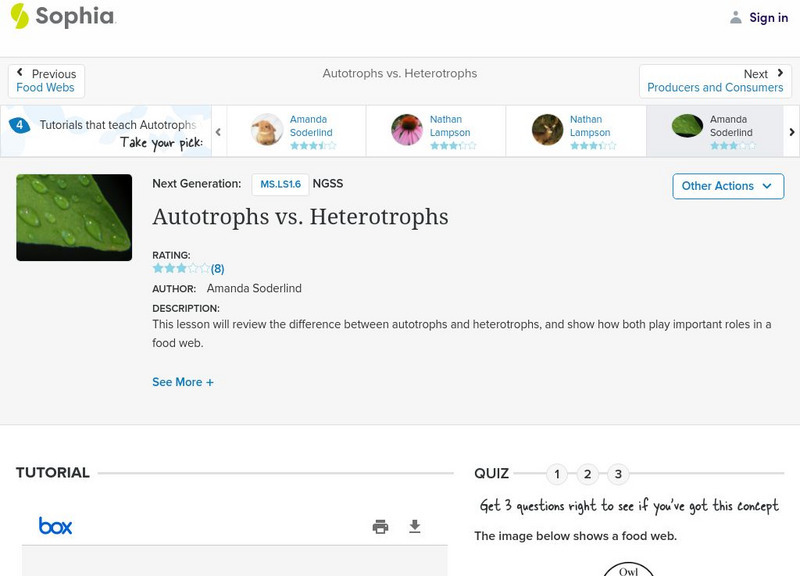Curated OER
Regents High School Examination: Living Environment 2009
Emerging ecologists need a full understanding of life, from the inner workings of a cell to the complex relationships among organisms. This examination is meant to assess high schoolers after an entire year course on the living...
Curated OER
Regents High School Examination: Living Environment 2003
The living environment, from the interior of a cell to the complex relationships among populations, are queried in this final examination. Learners look at air pollution maps, diagrams of cells, population graphs, and drawing of cells....
Curated OER
Regents High School Examination: Living Environment 2005
The 2005 version of the Regents High School Examination in the area of ecology is as comprehensive as previous years' exams. It consists of 40 multiple choice questions on everything from the structure of DNA to the interactions within...
Curated OER
Regents High School Examination: Living Environment 2007
Environmental science enthusiasts show what they know at the end of the year by taking this full-fledged final exam. They answer multiple choice, graph interpretation, and essay analysys questions, 73 of them in all. Topics range from...
Curated OER
Regents High School Exam: Living Environment 2008
Tne New York Regents High School Examinations are comprehensive and include various styles of questions, includingmultiple choice and the analysis of graphs. This particular version, the 2008 Living Environment exam surveys a variety of...
Curated OER
AP: Chapter 10: Photosynthesis
AP biologists or college-level botanists consider in-depth details of the photosynthetic process. They examine the structures in a leaf and the roles that they play. They label neat and colorful diagrams of photosystems and electron...
Curated OER
Cell Respiration Worksheet
Beginning biologists demonstrate their grasp on cellular respiration, photosynthesis, and energy flow though ecosystems when completing this learning exercise. Fifteen multiple choice and short answer questions test their knowledge....
Curated OER
Biology Jeopardy
Play Jeopardy as you review what might possibly be an entire year's high school biology course! The vast variety of questions requires that you read through the slides to make sure that they all relate to your curriculum. You could make...
Curated OER
Cycling of Matter and Energy
These twenty various types of questions related to the cycling of matter and energy require students to match each definition in column 1 with the correct vocabulary term from column 2. Then, students explain what is being demonstrated...
Curated OER
Kingdom Plantae
There are some great diagrams and labels on these slides that support the topic of plants. The definition of kingdoms, and summaries of the vascular systems and gamete production are given. This would be a perfect choice to kick off a...
Curated OER
The Principles of Ecology
In this ecology instructional activity, learners complete a word search by finding 21 terms associated with habitat, ecology, biosphere, and niche.
Curated OER
Nutrition and Energy Flow
In this energy flow learning exercise, students will complete 10 short answer questions based on a food web diagram. Then students will review different cycles in nature including the water cycle, carbon cycle, and energy cycle. This...
Curated OER
Studying Living Organisms
Students are introduced to Hardy-Weinberg Equilibrium without recourse to algebra. After participating in this activity, students gain a feeling for the significance of the Hardy-Weinberg Equilibrium without using algebra.
Curated OER
Cell Processes and Energy
In this biology worksheet, learners identify and locate various vocabulary terms pertaining to cell processes and energy. There are 19 biology terms located in the word search.
Nature Conservancy
The Nature Conservancy: Gardens Activity Guide: Soil
In this lesson learners conduct a soil analysis to understand soil types and explore the relationship between the garden and healthy, fertile soil. Soil is a natural resource that is crucial to life on Earth and when managed properly, it...
Science Education Resource Center at Carleton College
Serc: Investigating Discovering What Plants Need for Photosynthesis
This activity will be used prior to any direct instruction for photosynthesis. In this inquiry lab, middle schoolers design and conduct simple experiments using elodea and Bromthymol blue to determine whether plants consume or release...
Estrella Mountain Community College
Online Biology Book: Biological Diversity: Protists: Stem Eukaryotes
Through full-color images and descriptive information, learn about the evolution of the eukaryotic organisms which eventually led to the presence of protists.
Other
Marietta College: Ecosystems
Complete illustrated discussion of energy flow within ecosystems, including discussions of trophic levels, ecological pyramids, food chains and webs, biological magnification, and cycles.
The College Board
The College Board: Ap Biology 2007 Scoring Guidelines [Pdf]
This scoring guide can be used as a study guide, provding examples and exemplary student responses. The topic covered is energy flow in ecosystems.
Sophia Learning
Sophia: Food Webs: Lesson 1
This lesson will explain how to create a food web to show transfer of energy within a community. It is 1 of 4 in the series titled "Food Webs."
Sophia Learning
Sophia: Autotrophs vs. Heterotrophs: Lesson 2
This lesson will review the difference between autotrophs and heterotrophs, and show how both play important roles in a food web. It is 2 of 4 in the series titled "Autotrophs vs. Heterotrophs."
Mocomi & Anibrain Digital Technologies
Mocomi: Carbon Cycle
The carbon cycle is one of the most important cycles. It is the biogeochemical cycle by which carbon is exchanged among the biosphere, pedosphere, geosphere, hydrosphere, and atmosphere of the Earth. This cycle is important because it...
CK-12 Foundation
Ck 12: Life Science: Plant Like Protists
[Free Registration/Login may be required to access all resource tools.] Plant-like protists are known as algae. They are a large and diverse group. Plant-like protists are autotrophs. This means that they produce their own food. They...
Soft Schools
Soft Schools: Ecology Quiz
Take this interactive, multiple-choice quiz over concepts in ecology, then review your score and any missed questions at the end.









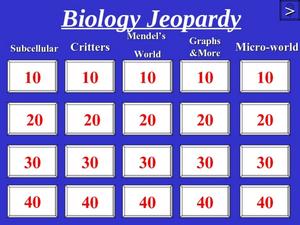




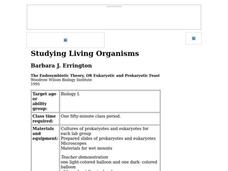

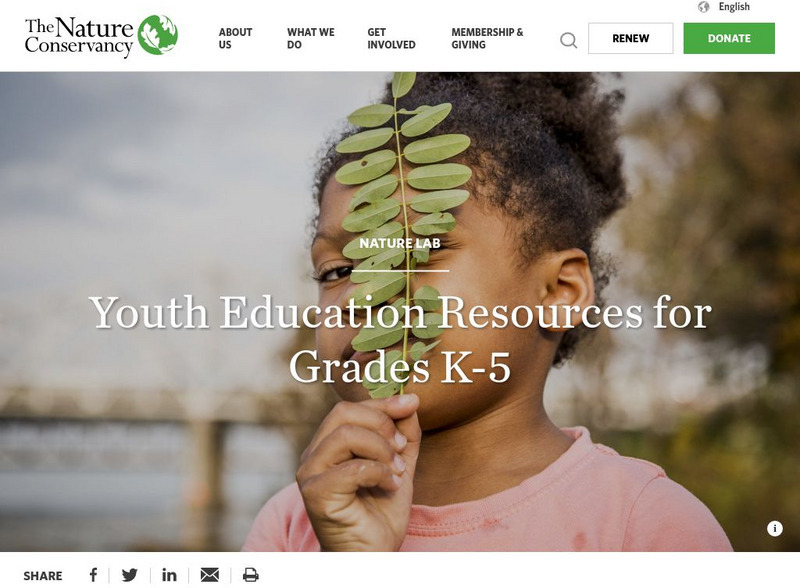

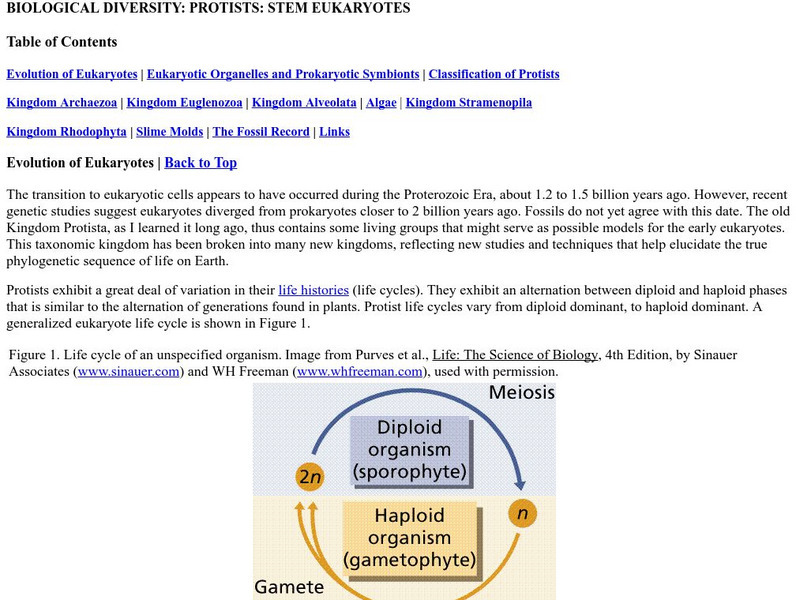
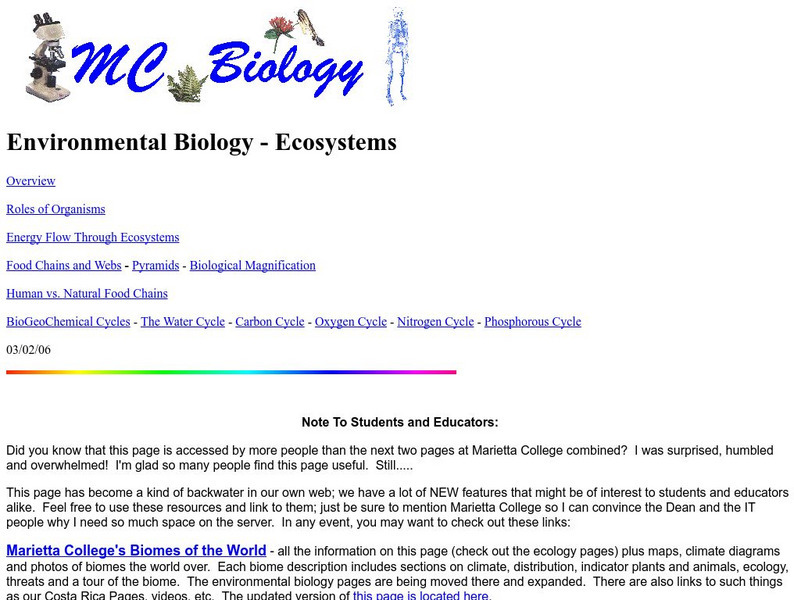
![The College Board: Ap Biology 2007 Scoring Guidelines [Pdf] Study Guide The College Board: Ap Biology 2007 Scoring Guidelines [Pdf] Study Guide](https://d15y2dacu3jp90.cloudfront.net/images/attachment_defaults/resource/large/FPO-knovation.png)

